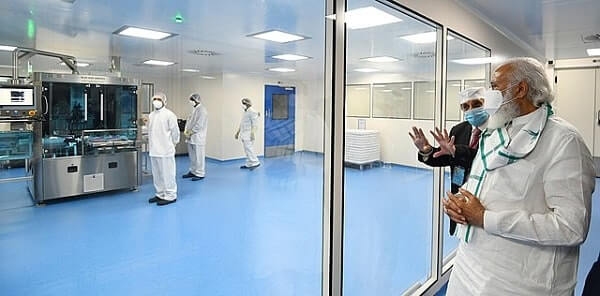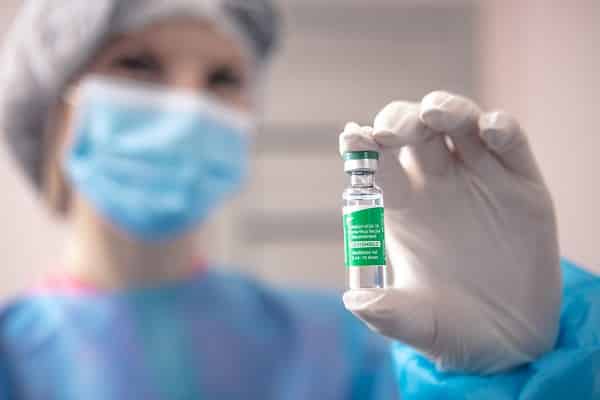Production lines in India, making at least 160 million doses of COVID vaccine a month, will come to a halt in the coming weeks unless America supplies 37 critical items, The Economist reported.
The world’s largest vaccine maker, Serum Institute of India’s (SII) Chief Executive Adar Poonawalla appealed to US President Joe Biden to lift the US embargo on exporting raw materials for COVID -19 vaccine production.
SII is manufacturing Covishield, developed by AstraZeneca and Oxford University. The vaccine is not only being used in India but also exported to a number of countries.
Tagging the Twitter handle of the President of the United States, Poonawalla wrote, “Respected @POTUS, if we are to truly unite in beating this virus, on behalf of the vaccine industry outside the US, I humbly request you to lift the embargo of raw material exports out of the US so that vaccine production can ramp up.”
US State Department Spokesperson Ned Price responded to media requests on the ban, saying the country had to take care of the requirements of its own people first.
“It’s, of course, not only in our interest to see Americans vaccinated, it’s in the interests of the rest of the world to see Americans vaccinated,” he stated.
Price first tried to sidetrack the issue of restrictions on vaccine raw materials exports by claiming that the reporter had asked about intellectual property rights for vaccines and that it was a matter for the US Trade Representative (USTR).
But the reporter from a Western news service had in fact asked only about the raw materials.
The question clearly was, “We reported that they (India) have asked the US to lift a ban on the export of vaccine raw materials, which basically threatens to slow the country’s vaccination drive. When will the administration decide on that?”
Price said, “You asked about intellectual property and certain controls. That was — is within the purview of USTR.”
The export controls do not, in fact, come under the jurisdiction of the USTR which deals only with the matters of intellectual property rights.
The Defence Production Act that has been invoked to boost vaccine production in the US is reported to curtail the export of raw materials needed elsewhere.

Price then said, “What I will say broadly is that the US first and foremost is engaged in an ambitious and effective and, so far, successful effort to vaccinate the American people. That campaign is well underway, and we’re doing that for a couple of reasons.”
“Number one, we have a special responsibility to the American people. Number two, the American people, this country has been hit harder than any other country around the world — more than 550,000 deaths, tens of millions of infections in this country alone,” he said.
But Price conceded that the spread of the virus elsewhere is also a threat to everyone.
He asserted that the US playing a “leadership role” in “seeking to contain the virus beyond our borders.”
He cited the US rejoining the World Health Organisation and Washington’s contribution of $2 billion to the COVAX facility that provides vaccines to developing countries and the promise of $2 billion more to it.
He said, “When it comes to India, (there is the) the Quad and the arrangement with the Quad, including to increase production capacity in India.”
The leaders of the Quad — Biden and Prime Ministers Narendra Modi of India, Yoshihide Suga of Japan and Scott Morrison of Australia — had agreed at their summit last month on a joint programme to supply Covid-19 vaccines to countries in the Indo-Pacific.
The vaccines manufactured by India with US and Japanese funding would be distributed with Australian logistics under the programme.
With the number of new COVID-19 cases nearly doubling over the past two months, approaching the highest infection rate the world has seen during the pandemic, the unequal distribution of vaccines is not only a moral outrage, but economically and epidemiologically self-defeating, the head of the UN health agency told a special ministerial meeting of the Economic and Social Council (ECOSOC) recently.
“Vaccine equity is the challenge of our time,” World Health Organisation (WHO) Director-General Tedros Adhanom Ghebreyesus told the gathering in his opening remarks. “And we are failing.”
READ ALSO: COVID-19: India’s vaccine rollout faces tough battles

Driving that point home, he said that of the 832 million vaccine doses administered, 82 per cent have gone to high or upper middle-income countries, while only 0.2 per cent have been sent to their low-income peers. In high-income countries alone, one in four people have received a vaccine, a ratio that drops precipitously to 1 in 500 in poorer countries.
In March, the WHO called on all countries to drop restrictions on the export of vaccines and vital components, as a rush for Covid-19 jabs puts pressure on global supply, Irish Times reported.
Several countries around the world have imposed bans or restrictions on exports of doses and key vaccine ingredients amid a scramble for stock, causing logjams in complex international pharmaceutical supply chains that could slow progress to end the pandemic, the global health body warned, as per the report.
“Some countries have imposed legal restrictions on the export of critical supplies. This is putting lives at risk around the world. We call on all countries not to stockpile supplies that are needed urgently to ramp up production of vaccines,” the WHO chief said.
IANS
READ ALSO: India’s daily COVID infections have surpassed the US and Brazil. Why?
Link up with us!
Indian Link News website: Save our website as a bookmark
Indian Link E-Newsletter: Subscribe to our weekly e-newsletter
Indian Link Newspaper: Click here to read our e-paper
Indian Link app: Download our app from Apple’s App Store or Google Play and subscribe to the alerts
Facebook: facebook.com/IndianLinkAustralia
Twitter: @indian_link
Instagram: @indianlink
LinkedIn: linkedin.com/IndianLinkMediaGroup



